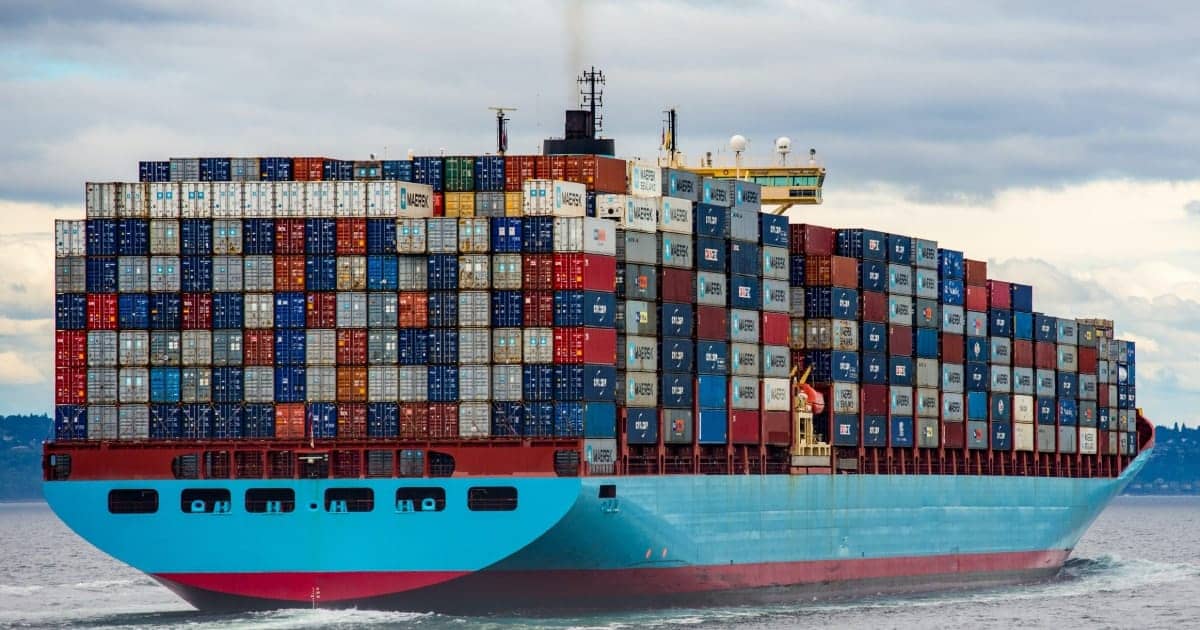Global Export Cross-border Influential Ecommerce Marketplace Summary
Export cross-border ecommerce platforms provide a broader overseas ecommerce marketplace for cross-border e-commerce entrepreneurs. By leveraging well-known international e-commerce platforms, cross-border e-commerce sellers can quickly expand into international markets and gain greater growth potential. But do you know which cross-border ecommerce platforms are available? How do these platforms rank?
There are numerous overseas ecommerce websites, so how should cross-border export entrepreneurs choose? In this article, we will introduce you to top online marketplace platforms, helping you combine your own foreign trade ecommerce business with the unique features of these platforms to select the most suitable one for yourself. Seize the opportunities in the global marketplace and expand your business.
European and American Cross-border Ecommerce Marketplace
Amazon
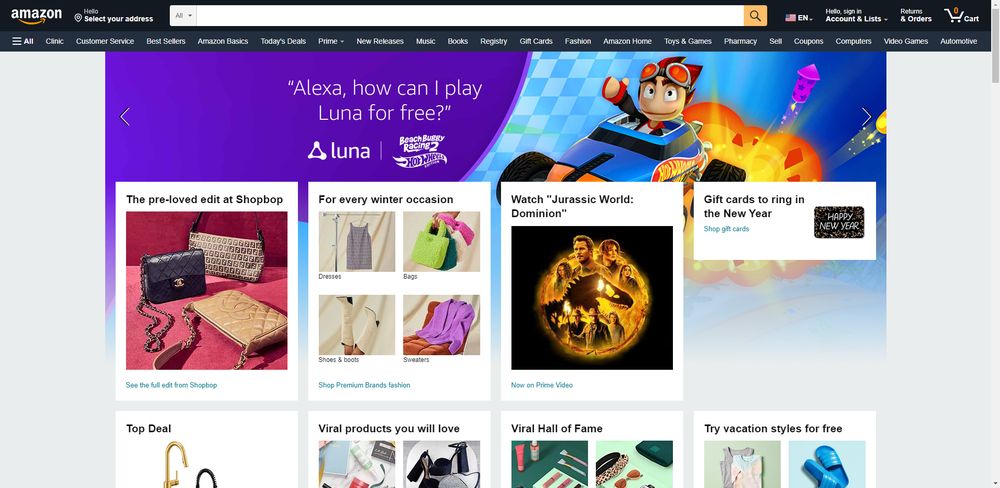
| Company Name | Amazon.com, Inc. |
| Founded Time | July 5th, 1994 |
| Headquarters | Seattle, Washington, USA |
| Founder | Jeff Bezos |
| Stock Code | AMZN (NASDAQ) |
| Business Mode | B2C |
| Website | https://www.amazon.com/ |
Amazon is currently the largest online ecommerce platform in the world. In our Amazon statistics report, we mentioned that Amazon currently has over 300 million active consumers worldwide. It operates in 20 different sites globally and has 185 FBA (Fulfillment by Amazon) logistics centers. Furthermore, Amazon’s e-commerce platform holds over 50% market share in the online shopping industry in the United States, offering sellers 30 major product categories and 25,000 subcategories.
According to relevant statistical data, Amazon dominates over 50% of the online shopping market share in the United States, which has attracted numerous Chinese cross-border e-commerce sellers to join its platform. However, as an international leading ecommerce platform, Amazon has strict seller rules and regulations. If you intend to become an Amazon seller, it is advisable to gather more information beforehand through Amazon forums or cross-border e-commerce forums.
eBay
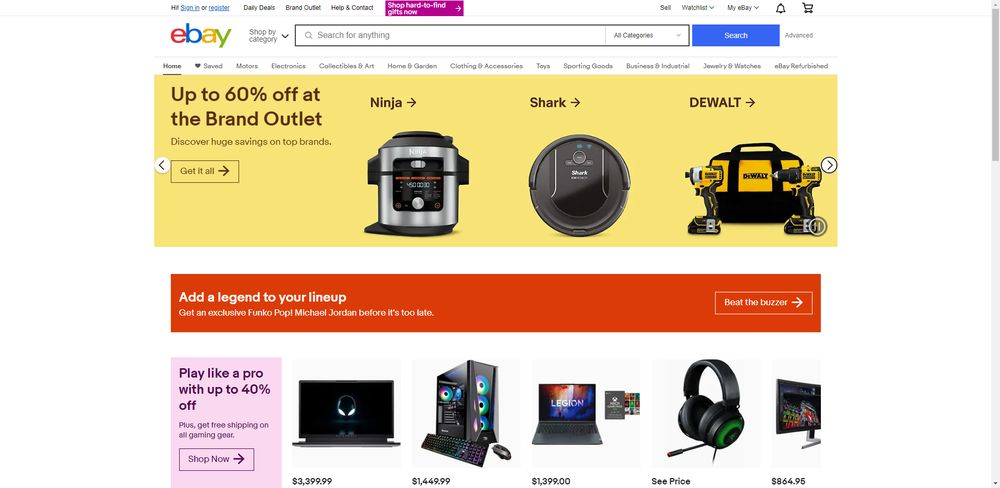
| Company Name | eBay Inc. |
| Founded Time | Sep.3rd, 1995 |
| Headquarters | SAN Jose, California, USA |
| Founder | Pierre Omidyar |
| Stock Code | EBAY (NASDAQ) |
| Business Mode | B2C |
| Website | https://www.ebay.com/ |
eBay is a globally recognized overseas online business platform, known as “Dianzi Wan” (电子湾), “Yi Bei” (亿贝), or “Yi Bei” (易贝) in Chinese. Its model is quite similar to Amazon, but eBay has a relatively small market share in the e-commerce industry in the United States. According to the latest data from the well-known foreign statistics website Statista, as of June 2022, eBay’s market share in the online retail industry in the United States is only 3.5%, ranking behind Amazon (37.8%), Walmart (6.3%), and Apple (3.9%).
eBay currently has 25 sites worldwide, covering 180 countries and regions globally, with 135 million active users. The major sellers on eBay come from the United States (31%), the United Kingdom (29%), Germany (15%), and China (12%). On the other hand, Amazon has attracted over half of the Chinese sellers. However, in order to attract Chinese sellers to join its platform, eBay has also established Shanghai Yi Bei Network Information Service Co., Ltd.
Walmart
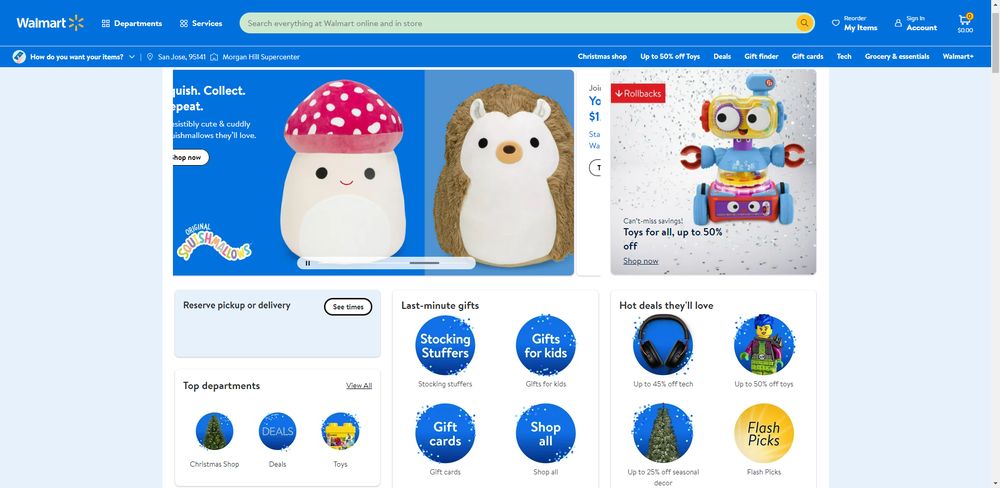
| Company Name | Walmart Inc. |
| Founded Time | Jan.2nd, 1962 |
| Headquarters | Bentonville, Arkansas, USA |
| Founder | Sam Walton |
| Stock Code | WMT (NYSE) |
| Business Model | B2C |
| Website | https://www.walmart.com/ |
Walmart is the largest retailer in the United States and one of the largest retailers globally. It was founded in 1962 and is headquartered in Bentonville, Arkansas, USA. According to the latest statistics, Walmart currently operates 10,500 offline stores in 24 countries and regions worldwide, with 5,320 stores in the United States alone (as of October 31, 2022).
However, despite its early establishment, Walmart didn’t venture into the online marketplace to sell until 2012, which is much later compared to Amazon. It has experienced growth only in recent years. Currently, Walmart’s online presence is mainly focused on its US, Mexico, and Canada sites. Although Walmart started its online journey relatively late, its extensive network of offline stores gives it a logistical advantage with faster delivery compared to Amazon. As a result, Walmart has become the second-largest online marketplace website in the United States, following Amazon.
Etsy

| Company Name | Etsy Inc. |
| Founded Time | Jun.18th, 2005 |
| Headquarters | Brooklyn, New York, USA |
| Founder | Rob Kalin Haim Schoppik Chris Maguire |
| Stock Code | ETSY (NASDAQ) |
| Business Mode | B2C、C2C |
| Website | https://www.etsy.com/ |
Etsy is the best ecommerce shopping platform that caters to a niche market. It primarily targets global independent manufacturers, artisans, and collectors, focusing on creative and customizable products. According to SimilarWeb website statistics, Etsy ranks fifth among global ecommerce online platforms. The Esty platform currently boasts 90.1 million active buyers and 5.3 million active sellers, including 10,512 sellers from China.
However, Etsy initially supported Chinese sellers to join the platform. But due to recurring issues with orders that used PayPal instead of Etsy Payments for receiving payments, Etsy officials made the decision that sellers using PayPal for receiving payments could not register new shops. However, if you believe that Etsy is a better fit for you, you can explore alternative methods to become an Etsy seller.
TikTok Shop
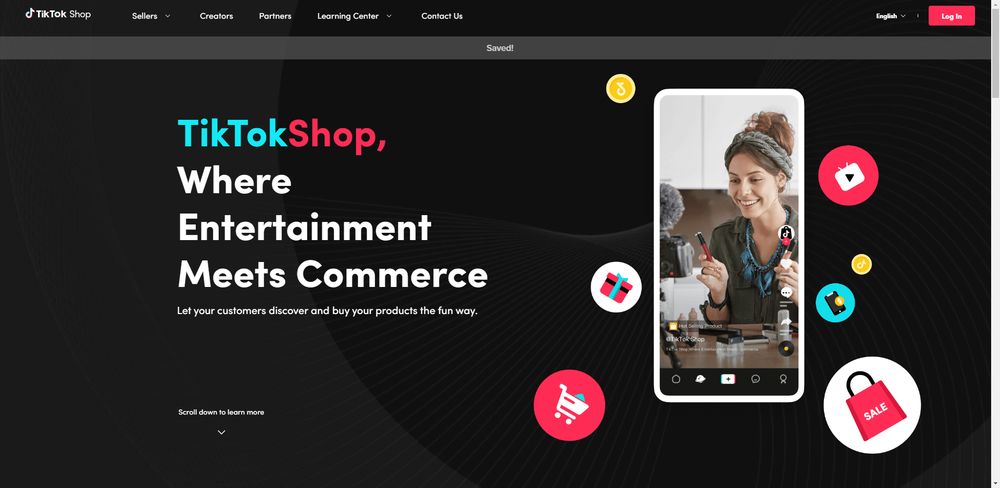
| Company Name | TikTok Inc. |
| Founded Time | Jun.11th, 2003 |
| Headquarters | Shanghai, China |
| Founder | Alex Zhu, Luyu Yang |
| Stock Code | Unlisted |
| Business Mode | B2C |
| Website | https://shop.tiktok.com/business/ |
TikTok has now become the most popular short video platform worldwide. It spans across more than 150 countries and regions, with over 1 billion active users globally and over 210 million application downloads in the United States. The extensive user base of TikTok has led the platform to explore new revenue models. In August 2021, TikTok announced the launch of TikTok Shop in collaboration with cross-border independent site service provider, Shopify. Currently, TikTok Shop is available in several countries, including the United States, the United Kingdom, Indonesia, Vietnam, Thailand, Malaysia, the Philippines, and Singapore.
When TikTok Shop was introduced, it already supported the entry of Chinese cross-border e-commerce sellers. However, there are certain requirements for sellers to join, as it only allows sellers with a Chinese business license and does not currently support individual sellers. Therefore, if you wish to join TikTok Shop, you can refer to the entry conditions outlined on the TikTok Shop official website.
AliExpress
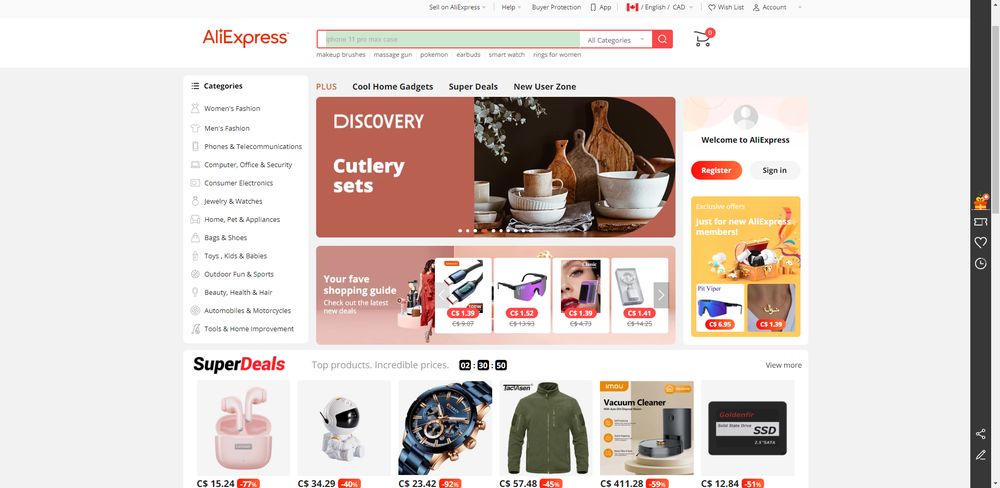
| Company Name | Alibaba Group |
| Founded Time | Apr.26th, 2010 |
| Headquarters | Hangzhou, Zhejiang, China |
| Founder | Jack Ma |
| Stock Code | BABA (NYSE) |
| Business Model | B2B、B2C |
| Website | https://www.aliexpress.com/ |
AliExpress (formerly known as Global AliExpress) is an e-commerce shopping website launched by Alibaba Group in 2010. It is one of the Alibaba Group’s subsidiaries dedicated to assisting global small and medium-sized enterprises in expanding their business internationally, making cross-border e-commerce more convenient. AliExpress initially started as a B2B platform but later expanded to include B2C, C2C, and other business models.
Currently, AliExpress has a global presence, covering 220 countries and regions, and supports 18 languages. It boasts over 150 million overseas sellers and offers a comprehensive range of 22 industry categories. Additionally, it supports local payment methods from 51 countries worldwide. For businesses targeting the global marketplace, AliExpress is a platform that you should consider joining.
Southeast Asia Cross-border Ecommerce Marketplace
Shopee
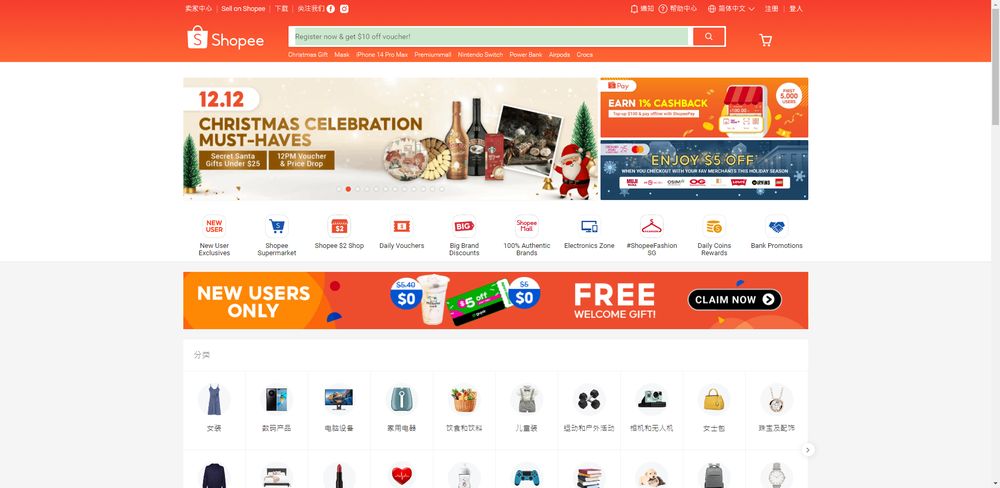
| Company Name | Shopee Pte. Ltd |
| Founded Time | Feb.5th, 2015 |
| Headquarters | Singapore |
| Founder | Chris Feng |
| Stock Code | SE (NYSE) |
| Business Model | B2C |
| Website | https://shopee.com/ |
Shopee is a popular online platform targeting the Southeast Asian and Taiwan markets. Established in 2015, the company is headquartered in Singapore. Its Chinese name is transliterated as “Xiāpí” or referred to as “Xiāpí Gòuwù,” originally known as “Xiāpí Pāimài” (Shopee Auction). Shopee was first launched in Singapore in 2015 and operates both online stores and physical stores, as well as logistics services. After years of development, Shopee has grown into a sizable cross-border e-commerce platform, covering markets such as Singapore, Malaysia, Philippines, Thailand, Vietnam, Brazil, Mexico, Colombia, Chile, Poland, and more, with a current presence in 11 sites.
According to data from Shopee’s Chinese site, the online sales of the platform recorded a total order volume of 6.1 billion in 2021, with a year-on-year growth of 116.5%. To assist Chinese sellers in expanding their reach overseas through the Shopee platform, Shopee has established offices in Shanghai, Shenzhen, and Hong Kong, along with the creation of the official Shopee China website, aiming to facilitate cross-border business for Chinese sellers.
Wish
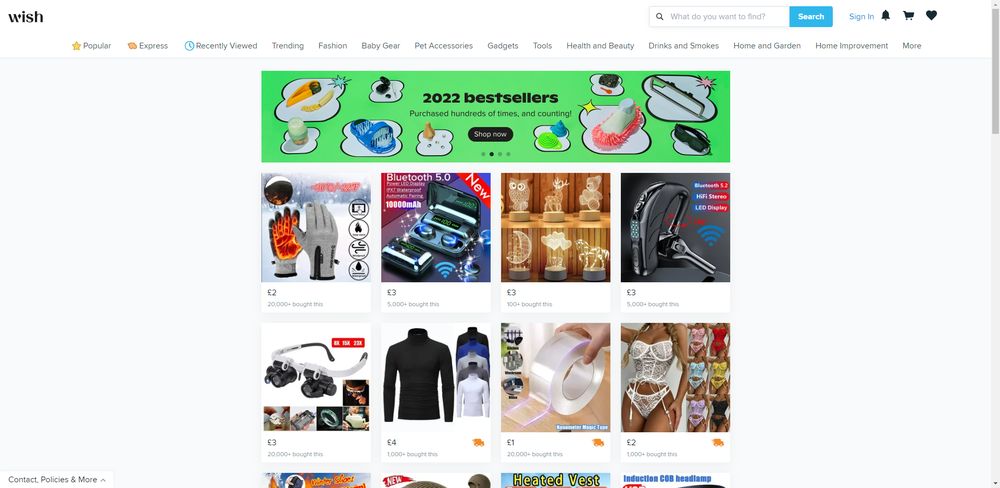
| Company Name | ContextLogic Inc. |
| Founded Time | July 4th, 2010 |
| Headquarters | San Francisco, California, USA |
| Founder | Peter Szulczewski, Danny Zhang |
| Stock Code | WISH (NASDAQ) |
| Business Model | B2C |
| Website | https://www.wish.com/ |
Wish is an online selling platform founded by Google and Yahoo engineers Peter Szulczewski and Danny Zhang. It was established on July 4, 2010, with its headquarters located in San Francisco, USA. However, what sets Wish apart from other e-commerce platforms is its primary focus on mobile shopping. Its unique feature lies in combining user preferences with advanced data algorithms to recommend relevant products to users.
According to recent statistics, Wish currently boasts over 26 million active users, with more than 600 million registered users and over 550,000 seller accounts. It has become the largest mobile e-commerce platform in North America and Europe. Currently, over 90% of sellers on the Wish platform are from China, and it is known for its friendly environment for Chinese sellers. It is considered a valuable cross-border e-commerce platform for Chinese sellers to establish their presence.
Lazada
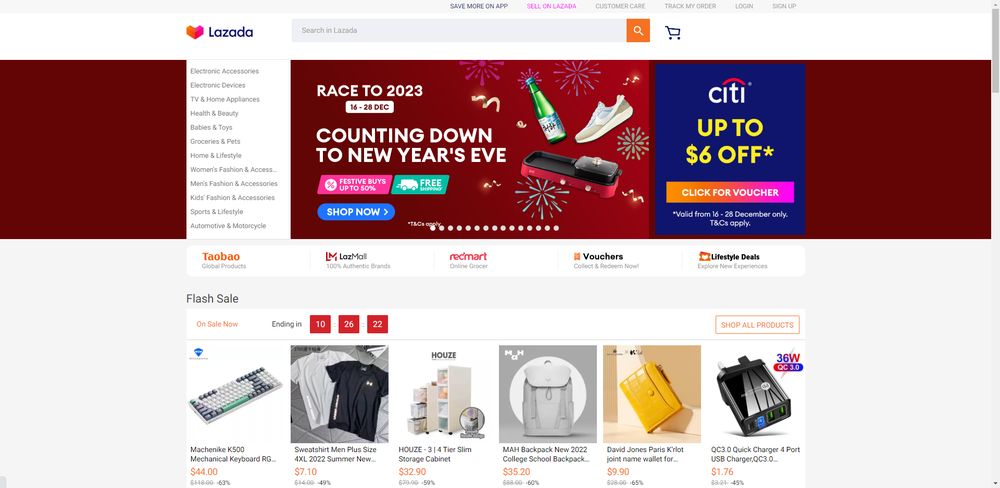
| Company Name | Lazada Group |
| Founded Time | Mar.27th, 2012 |
| Headquarters | Singapore |
| Founder | Maximilian Bittner |
| Stock Code | BABA (NYSE) |
| Business Model | B2C |
| Website | https://www.lazada.com/ |
Lazada is an e-commerce shopping platform established in 2012, with a focus on the Southeast Asian market. It was founded by Maximilian Bittner with the support of Rocket Internet, originally envisioned as an Amazon-like e-commerce platform for Southeast Asia. After years of development, Lazada was acquired by Alibaba in 2016 and became the largest e-commerce platform in Southeast Asia in 2018.
Currently, Lazada operates in six major Southeast Asian markets, including Indonesia, Malaysia, Philippines, Singapore, Thailand, and Vietnam. Leveraging the Alibaba platform, Lazada has amassed over 130 million active users and operates more than 30 warehousing centers across Southeast Asia. As a result, Lazada is considered a highly friendly platform for the Chinese to sell products as well.
China’s Cross-border Ecommerce Marketplace
Taoabo
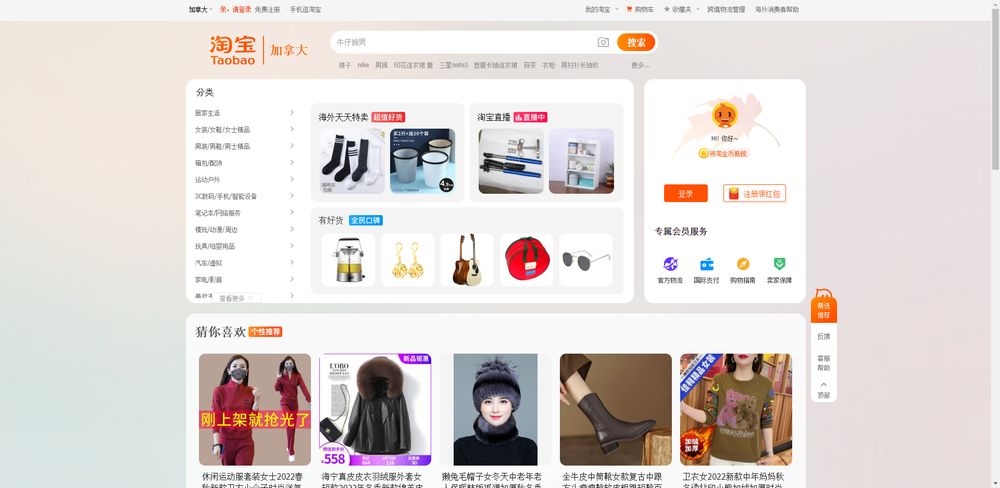
| Company Name | Alibaba Group |
| Founded Time | May 10th, 2003 |
| Headquarters | Hangzhou, Zhejiang, China |
| Founder | Jack Ma |
| Stock Code | BABA (NYSE) |
| Business Model | C2C |
| Website | https://www.taobao.com/ |
Taobao is an online shopping website in mainland China, owned by Alibaba Group. It was founded by Jack Ma on May 10, 2003, and has since become one of the largest online retail platforms in the Asia-Pacific region. Taobao initially adopted a free-entry strategy, attracting a large number of small and medium-sized sellers. Within a short span of two years, it became the leading player in China’s domestic online shopping market, capturing over 90% of the C2C (consumer-to-consumer) market in mainland China.
To further expand its ecommerce market reach, Taobao introduced online auctions and Xianyu, a platform for second-hand item transactions. Despite the emergence of numerous e-commerce platforms later on, Taobao has maintained its dominant position and continued to be a market leader.
Tmall
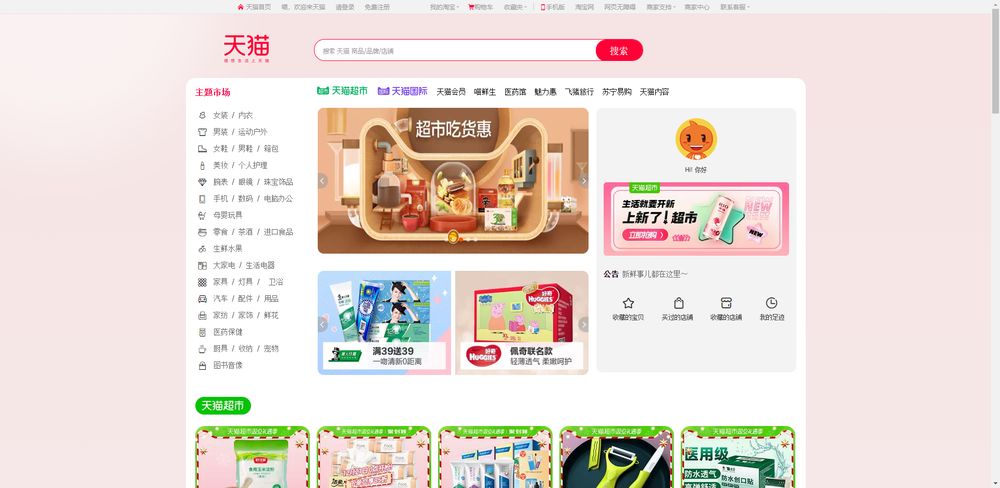
| Company Name | Alibaba Group |
| Founded Time | April 2008 |
| Headquarters | Hangzhou, Zhejiang, China |
| Founder | Jack Ma |
| Stock Code | BABA (NYSE) |
| Business Model | B2C |
| Website | https://www.tmall.com/ |
As Taobao continued to evolve, Alibaba Group announced on June 16, 2011, that it would split Taobao into three separate sites: Taobao Marketplace (taobao.com) for C2C business, Tmall (tmall.com) as a platform-based B2C e-commerce service provider, and eTao (etao.com) as a one-stop shopping search engine.
Tmall has become a top ecommerce representative of B2C in China, integrating tens of thousands of brands and merchants. To further expand its market, Tmall launched Tmall Supermarket, catering to people’s daily convenience. Additionally, Tmall set its sights on importing cross-border e-commerce and introduced Tmall Global on February 19, 2014. Compared to Taobao, Tmall has higher entry requirements for sellers.
(Note: “Tmall” is often referred to as “Tianmao” in Chinese, so the English translation retains the name “Tmall” for better recognition in the global e-commerce market.)
Jingdong
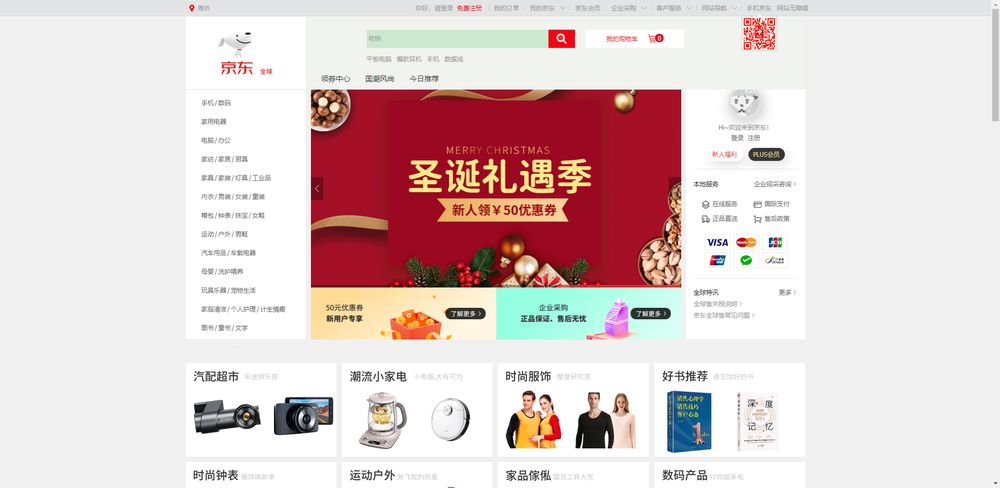
| Company Name | JD.com, Inc |
| Founded Time | June 18th, 1998 |
| Headquarters | Beijing, China |
| Founder | Richard Liu |
| Stock Code | JD (NASDAQ) |
| Business Model | B2C |
| Website | https://www.jd.com/ |
JD Group, founded by Liu Qiangdong in 1998, is a company that, despite its early establishment, initially operated solely as an online optical disc store. In 2003 and 2007, it underwent rebranding, first as 360buy.com and later as jd.com, also known as 360buy and JD Mall. Over the years, JD Mall has evolved into China’s largest B2C e-commerce platform for 3C products and has become one of the most popular and influential e-commerce websites in China.
Despite facing competition from rivals such as Taobao and Tmall, JD Group quickly carved out its own market share by leveraging its strengths. One key factor that propelled JD Group’s success was the establishment of its own logistics system, which played a crucial role in gaining consumer trust.
Pinduoduo
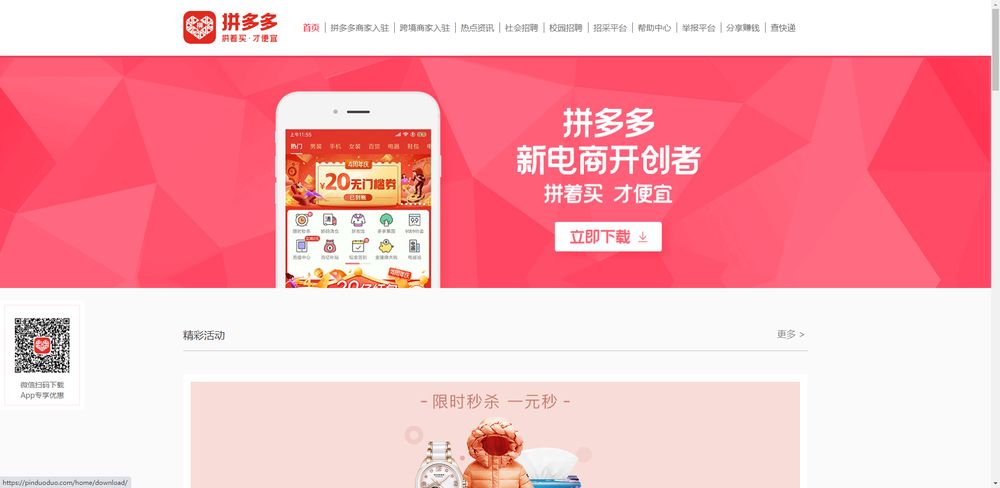
| Company Name | PDD Holdings |
| Founded Time | September 2015 |
| Headquarters | Shanghai, China |
| Founder | Colin Huang |
| Stock Code | PDD (NASDAQ) |
| Business Model | B2C |
| Website | https://pinduoduo.com/ |
Pinduoduo is a social e-commerce shopping platform based in mainland China, founded in 2015. It primarily focuses on mobile commerce and has its headquarters in Shanghai, China. Despite being relatively young, Pinduoduo has experienced rapid growth. It pioneered a unique model of agricultural product retailing with a focus on group buying, gradually evolving into a comprehensive e-commerce platform with a distinct emphasis on agricultural and sideline products.
Just how fast has Pinduoduo grown? Within a mere two years of its establishment, the platform surpassed a staggering 200 million active buyers. According to the latest statistics from Pinduoduo’s official website, as of August 26, 2021, the platform boasts a remarkable 849.9 million active buyers.
Japan’s Cross-border Ecommerce Marketplace
Amazon
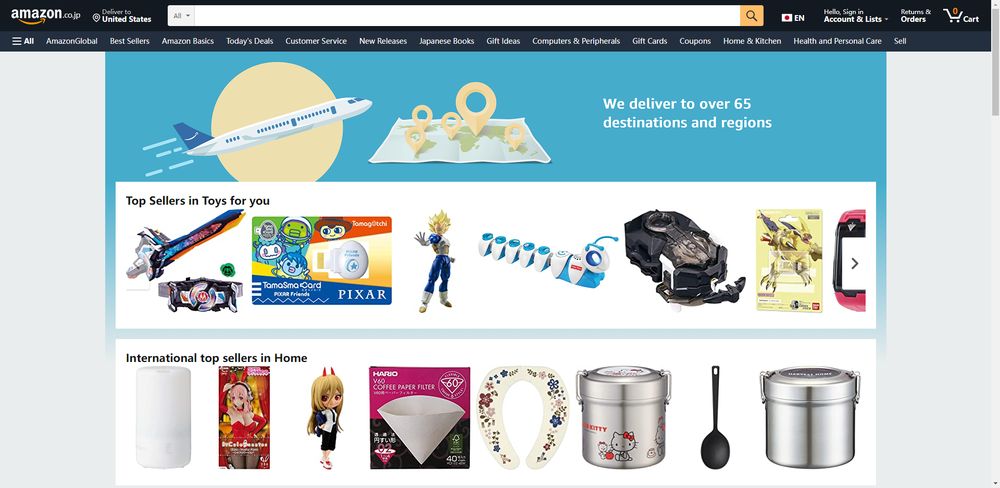
| Company Name | Amazon.com, Inc. |
| Founded Time | July 5th, 1994 |
| Headquarters | Seattle, Washington, USA |
| Founder | Jeff Bezos |
| Stock Code | AMZN (NASDAQ) |
| Business Model | B2C |
| Website | https://www.amazon.co.jp/ |
Amazon has up to 20 global sites, and Amazon Japan, targeting the Japanese market, is the third-largest economy in the world and one of the most developed e-commerce markets globally. Japan ranks sixth in terms of internet users globally, with a mature consumer base and high purchasing power in e-commerce. In fact, data suggests that the average online consumer spending in Japan is twice that of China and surpasses the average online spending of the United States.
If you’re looking to expand into the Japanese market, Amazon Japan is undoubtedly your top choice. It is the number one e-commerce platform in Japan. For Chinese cross-border e-commerce sellers, the physical distance between China and Japan is relatively short, and they can deliver goods to consumers within 10 days. Therefore, Amazon Japan presents a market worth exploring for Chinese sellers.
Rakuten
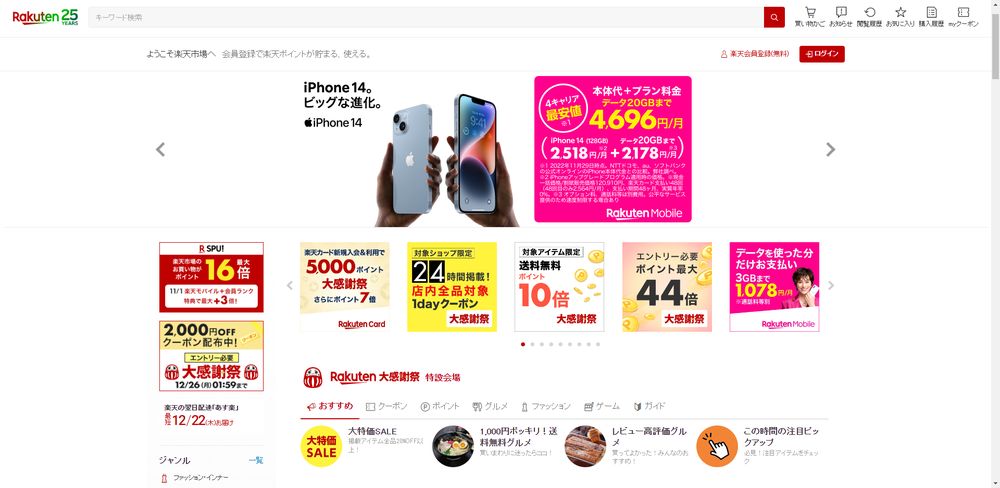
| Company Name | Rakuten Group, Inc. |
| Founded Time | Feb.7th, 1997 |
| Headquarters | Setagaya Ward, Tokyo, Japan |
| Founder | \Hiroshi Mikitani |
| Stock Code | RKUNY (OTCMKTS) |
| Business Model | B2C |
| Website | https://www.rakuten.co.jp/ |
Rakuten, known as “Rakuten Ichiba” in Japan, is a domestic e-commerce brand that was founded in February 1997. It is a subsidiary of Rakuten, Inc., a Japanese company. The Rakuten brand encompasses various sectors, including Rakuten Ichiba (Rakuten Market), Rakuten Bank, and Rakuten Travel, among others. According to statistics from Rakuten’s official website, Rakuten Ichiba holds a market share of over 26.8% in Japan’s e-commerce market, with nearly 33% of Japanese consumers making purchases through Rakuten.
Another data released by Rakuten indicates that as of 2021, the number of valid user IDs for domestic members in Japan has exceeded 120 million, which accounts for over 80% of the country’s population. Therefore, for Chinese sellers looking to export to Japan, Rakuten Ichiba, with its incredibly high market penetration, is a platform worth considering for establishing their presence.
Yahoo! Shopping
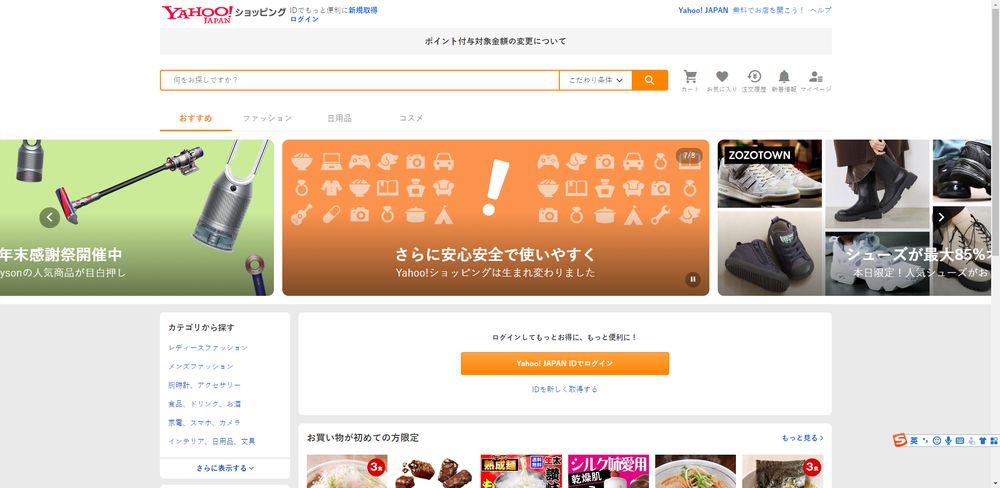
| Company Name | Yahoo! JAPAN |
| Founded Time | Jan.11th, 1996 |
| Headquarters | Tokyo, Japan |
| Founder | Yahoo Inc. Japan SoftBank Group |
| Stock Code | Parent company Z Holdings (Topix Part 1:4689) |
| Business Model | Portal website |
| Website | https://www.yahoo.co.jp/ |
Yahoo! Japan is a portal website established through a joint venture between Yahoo! Inc. from the United States and SoftBank from Japan. At the time, Yahoo! Inc. aimed to localize its operations in order to enter the Japanese market more swiftly. Yahoo! Shopping, a subsidiary site, is part of Yahoo! Japan. The Yahoo! e-commerce platform primarily consists of two main platforms: Yahoo! Shopping and Yahoo! Auction. The latter focuses mainly on the trading of used goods.
Leveraging the enormous traffic of Yahoo! Japan, the Yahoo! e-commerce platform attracts up to 28 million visitors each month, with over 90% of these visitors originating from Japan. According to relevant statistics, the GMV (Gross Merchandise Volume) of the Yahoo! e-commerce platform reached 85 billion yuan (approximately 40% of the combined GMV of Amazon Japan and Rakuten Ichiba) in 2021. However, the Yahoo! e-commerce platform is not fully open to cross-border e-commerce sellers and has certain entry requirements.
Russian Cross-border Ecommerce Marketplace
Joom
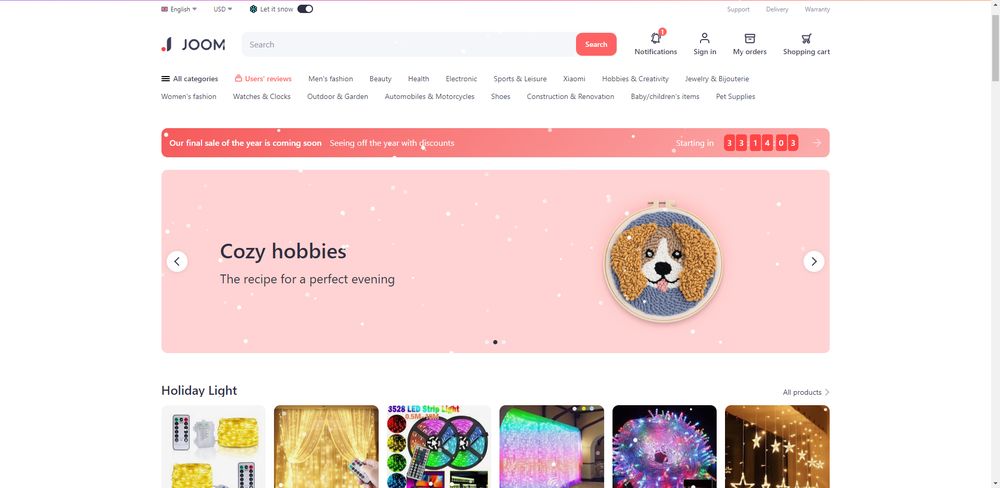
| Company Name | Joom(英文:Joom Inc.) |
| Founded Time | June 2016 |
| Headquarters | Riga, Latvia |
| Founder | Ilya Shirokov |
| Stock Code | Unlisted |
| Business Model | B2C |
| Website | https://www.joom.com/ |
Joom is a well-known Russian e-commerce platform established in June 2016. Initially targeting the domestic Russian market, Joom quickly emerged as one of the fastest-growing emerging e-commerce platforms in Europe. Joom focuses on building a mobile shopping platform and has expanded from Russia to over 20 countries and regions worldwide over the years.
According to the latest statistics, Joom has over 400 million users globally, with 25 million active users and 20 million active buyers. Furthermore, due to the close proximity between Russia and mainland China, logistics and delivery times are significantly reduced, coupled with the booming market of Chinese cross-border e-commerce. Joom opened its doors to Chinese sellers from the very beginning. For Chinese sellers looking to enter the Russian market, Joom is undoubtedly the preferred e-commerce platform.
Why Should I Join a Cross-border Ecommerce Platform?
Cross-border ecommerce marketplace is vast and helps globalization
Cross-border e-commerce involves selling goods to other countries and regions. For Chinese sellers, the domestic e-commerce market is highly competitive. However, engaging in cross-border e-commerce allows them to shift from domestic sales to international sales. On one hand, it enables them to leverage the advantages of the production origin of their goods, and on the other hand, it allows them to reach customers in over 200 countries and regions worldwide. This presents an excellent opportunity for companies or enterprises seeking to establish a global brand.
Cross-border ecommerce enjoys preferential policies
Cross-border e-commerce, involving the export of goods to other countries and regions, offers sellers the opportunity to earn higher exchange rate differentials, contributing to increased foreign exchange reserves for the country. Simultaneously, exporting goods significantly promotes international trade and helps address the issue of domestic overcapacity. To encourage companies to engage in foreign trade or cross-border e-commerce, governmental departments have implemented various preferential policies to assist businesses in expanding their operations overseas.
The features and advantages of the cross-border ecommerce platform itself
Cross-border e-commerce expansion currently relies mainly on two methods: cross-border e-commerce platforms and independent websites. Cross-border e-commerce platforms have been deeply rooted for many years, possessing a vast user base and mature e-commerce systems. Moreover, they offer low entry barriers for sellers. Additionally, if you aim to enter a specific country or region, there are corresponding overseas e-commerce platforms available for sellers to join.
Cross-border ecommerce enriches consumers’ shopping needs
Cross-border e-commerce involves the trade of goods to various countries and regions worldwide, each with its own shopping preferences and consumer demands. The existence of cross-border e-commerce provides consumers with a wider range of purchasing options and, to some extent, introduces them to more affordable and high-quality products.
Common FAQ for Cross-border Ecommerce Marketplace
What is the cross-border e-commerce platform?
Cross-border e-commerce platforms are online electronic commerce platforms built by companies or enterprises using modern computer network technology. They facilitate online transactions between buyers and sellers, addressing various challenges that traditional cross-border e-commerce faces, such as geographical limitations, time differences, and payment methods.
Which is the world’s largest international cross-border e-commerce platform?
For B2C platforms, Amazon is undoubtedly the largest B2C international cross-border e-commerce platform in the world. It currently operates in 20 different sites globally and boasts over 310 million active users, covering 180 countries and regions worldwide. On the other hand, for B2B platforms, Alibaba’s international site, Alibaba.com, holds the title of the largest B2B cross-border e-commerce platform globally. Its business spans across 200+ countries and regions, with over 150 million registered users worldwide. The platform attracts over 26 million active overseas buyers alone and has become the preferred choice for small and medium-sized enterprises in the realm of B2B cross-border e-commerce.
Summary
Cross-border e-commerce platforms indeed possess significant advantages, catering to a vast consumer user base while providing a user-friendly trading experience for both buyers and sellers. Especially for merchants venturing into international markets, they can leverage the traffic advantage of overseas e-commerce platforms to gain greater exposure for their products, leading to increased orders and customers. However, due to varying rules and policies across different cross-border e-commerce platforms, lack of understanding or non-compliance can easily result in severe consequences, similar to the “Amazon account suspension wave,” causing substantial losses for sellers.
If your cross-border e-commerce store gets suspended, and you find yourself at a loss, you can seek practical and actionable advice from international cross-border e-commerce experts on the ExpertPlanet platform. ExpertPlanet currently hosts over 600 professionals specializing in international law and business, ready to assist you in resolving various legal and business issues.
